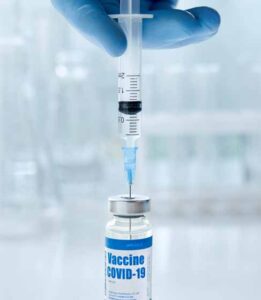 At a recent ACR virtual town hall, panelists presented a wealth of data on immune responses to, and side effects of, COVID-19 vaccination in patients with rheumatic disease and their implications for patient care and management. Panelists also discussed the importance of leveraging monoclonal antibody treatments, especially in light of virus variants.
At a recent ACR virtual town hall, panelists presented a wealth of data on immune responses to, and side effects of, COVID-19 vaccination in patients with rheumatic disease and their implications for patient care and management. Panelists also discussed the importance of leveraging monoclonal antibody treatments, especially in light of virus variants.
Efficacy in Immunosuppressed Patients
The first presenter, Alfred Kim, MD, PhD, an assistant professor in the Division of Rheumatology, Washington University School of Medicine, St. Louis, has been working with colleagues at his institution and at the University of California, San Francisco, to study the effects of different types of immunosuppressive medications on immune responses in patients with rheumatic disease who receive COVID-19 vaccination.1

Dr. Kim
Summarizing what is currently known, Dr. Kim noted that the majority of patients with rheumatic disease taking immunosuppressive drugs do become seropositive, meaning they produce detectable levels of antibodies in response to vaccination against SARS-CoV-2. Composite seropositivity rates for immunosuppressed patients with rheumatic illness in various studies range from 75–94%, although it is important to note that lower rates have been found for certain subsets of patients taking specific medications. This contrasts with 95–100% positivity in immunocompetent participants in these studies and in general clinical vaccine trials.1-9
Patients with rheumatic disease taking immunosuppressive medications demonstrate a modest decrease in the number of antibodies produced, with an estimated 1.4-fold to three-fold reduction relative to immunocompetent individuals included in comparator groups.1-9
“Does this mean [these patients] are less protected?” Dr. Kim asked. “This is an answer I can’t provide, and I don’t think we are going to have an answer any time soon.” We don’t know yet what antibody level—or that of other potential immune markers—imparts protection.
Dr. Kim noted that, for most of the study patients, levels of antibodies to help prevent viral infection assessed by general tests seemed to correlate well with levels of neutralizing antibodies shown on in vitro assays. This indicates “the vaccination of immunosuppressed patients with rheumatic disease is effective for the most part,” he said.
The research community has also identified specific types of immunosuppression that seem to have the largest effects on antibody production. For these patients, seropositivity rates are lower compared with pooled rates of patients on different types of immunosuppression. Not surprisingly, given the role of B cells in mounting an antibody response, B cell depleting therapies, such as rituximab, may reduce antibody titers the most; reported seropositivity rates range from 26% to 68%, with antibody titers ranging from sevenfold to 625-fold lower than immunocompetent people.1,2,4,8,10-12 Notably, Dr. Kim explained, patients can successfully generate at least some antibodies—even if not quite at the levels of immunocompetent individuals—if they receive vaccination at least six months after their last dose of rituximab.
Mycophenolate mofetil is also a potential concern, with studies showing a 64% to 73% seropositivity rate and a 31-fold reduction in antibody titers in patients taking the drug.2,4,8 The data associated with prednisone have been more variable, probably partly due to effects of dose variability and the degree of immunosuppression. Studies have shown rates of seropositivity from 64% to 82% and titers dropping from 10-fold to 31-fold.1,2,4,8 The use of glucocorticoids as part of combination therapy with other immunosuppressants also seems to more strongly attenuate immune responses. We don’t know yet if a threshold dose exists for adequate immune responsiveness.8
Other medications, including JAK inhibitors and anti-metabolites, such as methotrexate and leflunomide, have shown more modest suppressive effects on seropositivity and antibody titers, although the reductions vary substantially by study.1,2,4,6,7 Dr. Kim and colleagues also documented a 2.5-fold decrease in antibody levels in patients taking tumor necrosis factor inhibitors.1
Dr. Kim suspects that patients with low or absent antibody responses may be more prone to breakthrough infections, although direct data are not yet available. Data do show that current vaccines are highly effective against the Delta variant in preventing hospitalization and ICU stays among immunocompetent populations. “Whether or not this is also observed in the immunosuppressed with reduced titers of antibodies remains to be seen,” he said.
Dr. Kim pointed out that antibody levels don’t indicate antibody structure diversity. Generating enough antibody diversity may ultimately prove important to one’s ability to neutralize SARS-CoV-2 variants, such as the Delta variant. Dr. Kim and his team are planning to specifically examine the impact of the Delta variant on immune response in patients with rheumatic disease taking different types of immunosuppressants.
Many attendees posed questions about a potential role for vaccine boosters. Dr. Kim speculated, “I think, in the rheumatic disease population, eventually boosters will become part of the armamentarium for providers to mitigate some of the risks from immunosuppression.” But it’s not yet clear which patients may ultimately benefit from such interventions.
ACR Supports 3rd Vaccine Dose for Immunocompromised Patients
On Aug. 13, the ACR issued a statement in support of the recommendation from the Centers for Disease Control and Prevention’s (CDC) Advisory Committee on Immunization Practices that rheumatology patients being actively treated with high-dose corticosteroids, alkylating agents, antimetabolites, tumor-necrosis factor (TNF) blockers, and other biologic agents that are immunosuppressive or immunomodulatory receive a third dose of the Pfizer-BioNTech or Moderna mRNA COVID-19 vaccines.“This will be enormously important for our immunocompromised patients, and we are thankful to the FDA and CDC for hearing our concerns, recognizing the needs of this population and moving forward,” stated ACR President Dr. David Karp. “We look forward to working with the agencies as they communicate this new recommendation.”
The additional dose of mRNA COVID-19 vaccine should be administered at least 28 days after completion of the primary vaccine series, and patients and providers should stick to the same brand for the third dose, if possible.
Vaccine Safety
In April 2021, the Global Rheumatology Alliance, a group of patients, clinicians and researchers studying the impact of COVID-19 on patients with rheumatic disease, launched a survey of rheumatic disease patients, of whom 2,860 had received at least one COVID-19 vaccine dose. Jean Liew, MD, MS, assistant professor, Division of Rheumatology, Boston University School of Medicine, presented some unpublished data from the patient survey.

Dr. Liew
Among other findings, Dr. Liew shared that 13% of surveyed patients reported experiencing a flare after receiving their first vaccination that lasted at least two days, and 5% reported requiring a medication change to help manage these symptoms. These results are roughly in line with those from a different survey of 1,100 outpatients with systemic rheumatic disease who had received at least one dose of SARS-CoV-2 vaccine, in which about 15% of these patients reported a disease flare post-vaccination.13
However, these results may highlight some differences between physician-assessed flares and patient-reported symptoms that may not meet medical criteria for a flare. In the physician-reported EULAR COVAX registry, with data from 1,519 vaccinated patients with rheumatic and musculoskeletal diseases, flare was reported for 5% of the 1,519 vaccinated patients, with severe flare in about 1%.14 In the VALCOLUP survey of almost 700 patients with lupus, 3% reported a medically confirmed flare. Results from much smaller prospective, physician-reported studies out of Germany and Israel did not document an increased risk of significant disease flare.4,5
Although it will take more time to understand the true rates of disease flare after vaccination, it’s important to keep emphasizing to patients that rheumatologists can treat any flare symptoms, should they occur, and that the risks from not getting vaccinated are much more significant.
Treatment
Another speaker, Michael R. Anderson, MD, MBA, highlighted monoclonal antibodies as a key therapeutic option, particularly for non-hospitalized COVID-19 patients in an early phase of the disease. Dr. Anderson, a senior advisor in the Office of the Assistant Secretary for Preparedness and Response, U.S. Department of Health & Human Services, Washington, D.C., has performed a key leadership role on the COVID-19 monoclonal antibody therapeutics team.

Dr. Anderson
Monoclonal antibodies act specifically against the spike protein of SARS-CoV-2, blocking the virus’ attachment and entry into human cells. To date, the U.S. Food & Drug Administration (FDA) has issued three different Emergency Use Authorizations (EUAs) for monoclonal antibody therapies that remain active: dual treatment with casirivimab and imdevimab, developed by Eli Lilly; dual treatment with casirivimab and imdevimab, developed by Regeneron; and most recently, treatment with sotrovimab (developed by GlaxoSmithKline). All three formulations are available in intravenous options, and Regeneron now has a subcutaneous option. (Note: The FDA issued another EUA, for Eli Lilly’s bamlanivimab, but later revoked it.)
According to the EUA criteria, monoclonal antibody treatments can be administered within 10 days after symptom onset in patients 12 years of age or older who aren’t sick enough to require hospital admission. “They have proved to decrease the need for hospitalization by about 70% when administered early,” Dr. Anderson noted.
Initial EUA guidelines required that patients receiving these therapies fall into specific, high-risk categories, such as being 65 years of age or older or having such medical conditions as chronic kidney disease or diabetes. Under the updated criteria, clinicians have discretion to prescribe these treatments to any patient they believe may progress and develop severe disease. “I think that’s really a game changer for clinicians,” Dr. Anderson said. Currently, monoclonal antibodies are believed to be effective against viral variants of concern.
At the end of July, the FDA also expanded its indication for the Regeneron monoclonal combination based on results from recent phase 3 data. Physicians can now prescribe this treatment as post-exposure prophylaxis for certain people exposed to an individual infected with SARS-CoV-2. The eligible group includes people taking immunosuppressants who may not have mounted an adequate immune response via vaccination.16
Dr. Anderson urged clinicians to make use of these therapies, which can be administered at hospitals, urgent care centers, mobile sites and other locations. He added, “It’s good for our individual patients. It’s also good for our very fragile, very tired and very burned out healthcare system, so that we don’t have our emergency departments flooded again with more patients.”
Rheumatologists seeking to access these treatments can check availability online. Dr. Anderson also encouraged clinicians to check availability in their local communities through academic centers or federally qualified health centers.
Ruth Jessen Hickman, MD, is a graduate of the Indiana University School of Medicine. She is a freelance medical and science writer living in Bloomington, Ind.
References
- Deepak P, Kim W, Paley MA, et al. Glucocorticoids and B cell depleting agents substantially Impair immunogenicity of mRNA vaccines to SARS-CoV-2. medRxiv. 2021 Apr 9;2021.04.05.21254656. Preprint.
- Braun-Moscovici Y, Kaplan M, Braun M, et al. Disease activity and humoral response in patients with inflammatory rheumatic diseases after two doses of the Pfizer mRNA vaccine against SARS-CoV-2. Ann Rheum Dis. 2021 Jun 18:annrheumdis-2021-220503.
- Connolly CM, Boyarsky BJ, Ruddy JA, et al. Absence of humoral response after two-dose SARS-CoV-2 messenger RNA vaccination in patients with rheumatic and musculoskeletal diseases: A case series. Ann Intern Med. 2021 May 25:M21–1451.
- Furer V, Eviatar T, Zisman D, et al. Immunogenicity and safety of the BNT162b2 mRNA COVID-19 vaccine in adult patients with autoimmune inflammatory rheumatic diseases and in the general population: A multicentre study. Ann Rheum Dis. 2021 Jun 14:annrheumdis-2021-220647.
- Geisen UM, Berner DK, Tran F, et al. Immunogenicity and safety of anti-SARS-CoV-2 mRNA vaccines in patients with chronic inflammatory conditions and immunosuppressive therapy in a monocentric cohort. Ann Rheum Dis. 2021 Mar 24:annrheumdis-2021-220272.
- Haberman RH, Herati R, Simon D, et al. Methotrexate hampers immunogenicity to BNT162b2 mRNA COVID-19 vaccine in immune-mediated inflammatory disease. Ann Rheum Dis. 2021 May 25:annrheumdis-2021-220597.
- Mahil SK, Bechman K, Raharja A, et al. The effect of methotrexate and targeted immunosuppression on humoral and cellular immune responses to the COVID-19 vaccine BNT162b2: A cohort study. Lancet Rheumatol. 2021 Jul 8.
- Ruddy JA, Connolly CM, Boyarsky BJ, et al. High antibody response to two-dose SARS-CoV-2 messenger RNA vaccination in patients with rheumatic and musculoskeletal diseases. Ann Rheum Dis. 2021 May 24:annrheumdis-2021-220656.
- Simon D, Tascilar K, Fagni F, et al. SARS-CoV-2 vaccination responses in untreated, conventionally treated and anticytokine-treated patients with immune-mediated inflammatory diseases. Ann Rheum Dis. 2021 May 6:annrheumdis-2021-220461.
- Bonelli MM, Mrak D, Perkmann T, et al. SARS-CoV-2 vaccination in rituximab-treated patients: evidence for impaired humoral but inducible cellular immune response. Ann Rheum Dis. 2021 May 6:annrheumdis-2021-220408.
- Mrak D, Tobudic S, Koblischke M, et al. SARS-CoV-2 vaccination in rituximab-treated patients: B cells promote humoral immune responses in the presence of T-cell-mediated immunity. Ann Rheum Dis. 2021 July 20: 10.1136/annrheumdis-2021-220781.
- Stefanski A, Rincon-Arevalo H, Schrezenmeier E, et al. B cell numbers predict humoral and cellular response upon SARS-CoV-2 vaccination among patients treated with rituximab. medRxiv. Preprint.
- Barbhaiya M, Levine JM, Bykerk VP, Jannat-Khah D, Mandl LA. Systemic rheumatic disease flares after SARS-CoV-2 vaccination among rheumatology outpatients in New York City. Ann Rheum Dis. 2021 Jun 22:annrheumdis-2021-220732.
- Machado PM, Lawson-Tovey S, Hyrich K. COVID-19 vaccine safety in patients with rheumatic and musculoskeletal disease [abstract, LB0002]. Ann Rheum Dis. 2021;80(suppl 1):199.
- Felten R, Kawka L, Dubois M, et al. Tolerance of COVID-19 vaccination in patients with systemic lupus erythematosus: The international VACOLUP study. Lancet Rheumatol. 2021 Jul 21.
- FDA expands authorized use of REGEN-COV (casirivimab and imdevimab). Regeneron news release. 2021 Jul 30.



